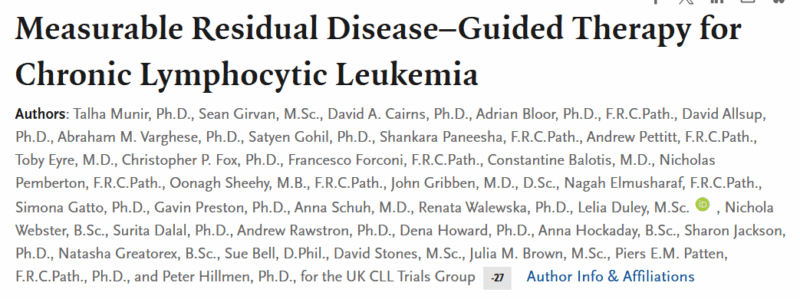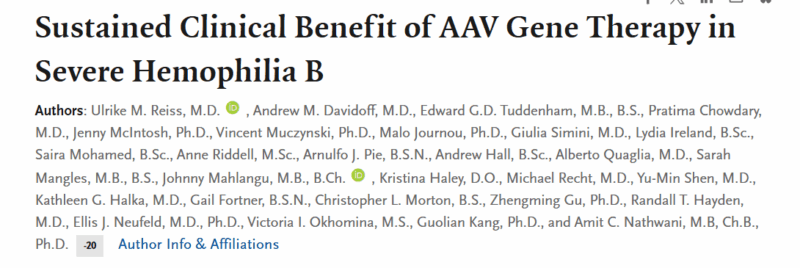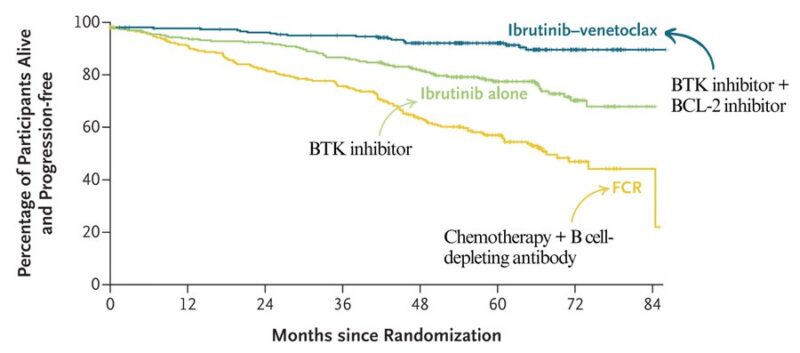Samuel Hume, Fellow at The Foulkes Foundation and pursuing PhD in the University of Oxford’s Department of Oncology, posted on X:
“Top 5 Advances in Medicine This Week
1. Improving leukemia treatment
Chronic lymphocytic leukemia (CLL) is a B cell cancer partially driven by a tyrosine kinase, BTK, and an anti-apoptotic protein, BCL-2
This phase 3 trial tests a combination of a BTK inhibitor (Ibrutinib) and a BCL-2 inhibitor (Venetoclax)
Ibrutinib-Venetoclax improved progression-free and overall survival vs. previous standards of care
Ibrutinib causes cardiovascular off-target effects in some patients, so cardio-safer versions are now being tested – and already have approval (with Venetoclax) in some countries.
Title: Measurable Residual Disease–Guided Therapy for Chronic Lymphocytic Leukemia
Authors: Talha Munir, Sean Girvan, David A. Cairns, Adrian Bloor, David Allsup, Abraham M. Varghese, Satyen Gohil, Shankara Paneesha, Andrew Pettitt, Toby Eyre, Christopher P. Fox, Francesco Forconi, Constantine Balotis, Nicholas Pemberton, Oonagh Sheehy, John Gribben, Nagah Elmusharaf, Simona Gatto, Gavin Preston, Anna Schuh, Renata Walewska, Lelia Duley, Nichola Webster, Surita Dalal, Andrew Rawstron, Dena Howard, Anna Hockaday, Sharon Jackson, Natasha Greatorex, Sue Bell, David Stones, Julia M. Brown, Piers E.M. Patten, Peter Hillmen
Read The Full Article at The NEJM.

2. Long-term follow-up for a haemophilia B gene therapy
Haemophilia B causes bleeding due to deficiency in clotting factor IX – it usually affects males. This is a therapy that delivers a functional copy of the factor IX gene to the liver via an adeno-associated virus (AAV)
There’s only 10 patients but, with a follow-up of 12 years, patients had fewer bleeds and most no longer needed factor IX infusions. It was safe, too – there was no increased clotting risk or chronic liver disease
This gene therapy used a wildtype factor IX, but newer therapies use a variant of factor IX that’s more active – so the outcomes might get better yet.
Title: Sustained Clinical Benefit of AAV Gene Therapy in Severe Hemophilia B
Authors: Ulrike M. Reiss, Andrew M. Davidoff, Edward G.D. Tuddenham, Pratima Chowdary, Jenny McIntosh, Vincent Muczynski, Malo Journou, Giulia Simini, Lydia Ireland, Saira Mohamed, Anne Riddell, Arnulfo J. Pie, Andrew Hall, Alberto Quaglia, Sarah Mangles, Johnny Mahlangu, Kristina Haley, Michael Recht, Yu-Min Shen, Kathleen G. Halka, Gail Fortner, Christopher L. Morton, Zhengming Gu, Randall T. Hayden, Ellis J. Neufeld, Victoria I. Okhomina, Guolian Kang, Amit C. Nathwani
Read The Full Article at NEJM.

3. An answer to an age-old question
Which is the better fluid for hospitalized patients: normal saline or Ringer’s lactate (Hartmann’s)? This is the first hospital-wide trial to test the question: the stock fluid in hospitals was the intervention
It’s a massive cluster-randomized trial, with 7 hospitals and 43,626 patients. There was a trend towards Ringer’s lactate – but no significant difference (in 90-day death/readmission)
The main limitations are that the trial wasn’t powered to detect small differences, that there’s no data on biochemistry (e.g. hyperchloremic acidosis), and that adherence to assigned fluid wasn’t 100%.
Title: A Crossover Trial of Hospital-Wide Lactated Ringer’s Solution versus Normal Saline
Authors: Lauralyn McIntyre, Dean Fergusson, Tracy McArdle, Shane English, Deborah J. Cook, Alison E. Fox-Robichaud, Claudio Martin, John Marshall, Michael Pugliese, Kusum Menon, Kednapa Thavorn, Ian D. Graham, Steven Hawken, Akshai Iyengar, Kwadwo Kyeremanteng, Raphael Saginur, Andrew J.E. Seely, Ian G. Stiell, Daniel Bainbridge, Charles Weijer, Monica Taljaard
Read The Full Article at NEJM.

4. Approval of a new ROS1 inhibitor for lung cancer
~1–3 % of non-small cell lung cancers are driven by a fusion of the ROS1 tyrosine kinase that activates it continuously – this usually affects younger patients and never-smokers
These are two pooled single-arm, phase 2 trials that tested Taletrectinib, a ROS1-selective, brain-penetrant tyrosine kinase inhibitor, and led to its FDA-approval this week
It was more effective against ROS1 mutants and brain metastases than some previous ROS1 inhibitors, with a gentler neurologic safety profile. Ongoing head-to-head trials vs. earlier-generation ROS1 inhibitors will determine whether taletrectinib becomes the first-line standard.
Title: Taletrectinib in ROS1+ Non–Small Cell Lung Cancer: TRUST
Authors: Maurice Pérol, Wei Li, Nathan A. Pennell, Geoffrey Liu, Yuichiro Ohe, Filippo De Braud, Misako Nagasaka, Enriqueta Felip, Anwen Xiong, Yongchang Zhang, Huijie Fan, Xicheng Wang, Shuanglian Li, Rose K. Lai, Feiwu Ran, Xianyu Zhang, Wenfeng Chen, Lyudmila Bazhenova, Caicun Zhou
Read The Full Article at JCO ASCO.

5. Towards fluent speech with brain implants
Conditions like motor neuron disease can cause loss of speech
Early devices aim to restore this speech by reading and decoding the signals from speech-producing neurons and converting them to speech – via a computer. This new device has lower latency than previous methods, restores the rhythm of speech, allows emphasis on individual words – and even singing
It’s still slower and less clear than natural speech, and it’s an invasive approach that requires neurosurgery, but, with further improvements, this could help restore speech to patients who’ve lost it due to conditions like motor neuron disease.
Title: An instantaneous voice-synthesis neuroprosthesis
Authors: Maitreyee Wairagkar, Nicholas S. Card, Tyler Singer-Clark, Xianda Hou, Carrina Iacobacci, Lee M. Miller, Leigh R. Hochberg, David M. Brandman, Sergey D. Stavisky
Read the Full Article at Nature.

More posts featuring Samuel Hume.



